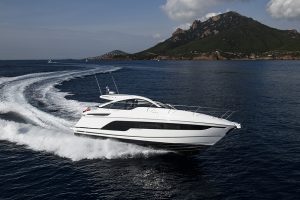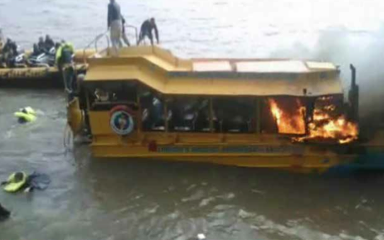London duck boat fire caused by foam packed around engine compartment
A report by the Marine Accident Investigation Branch concluded that the foam provided a ready source of fuel
An investigation by the Marine Accident Investigation Branch (MAIB) has found that unprotected
buoyancy foam packed around the engine compartment of a duck boat led to the fire on board in September 2013.
A total of 30 passengers and crew were forced to abandon Cleopatra after a major fire took hold during London Duck Tour’s (LDT) amphibious sightseeing tour on the Thames.
Everyone rapidly abandoned the DUKW vessel and luckily no one was injured or killed as a result of the incident.
A report into the fire found that buoyancy foam recently packed into the central void space provided a “ready source of fuel for the blaze”.
Following a previous incident in which a duck boat in Liverpool sank due to inadequate amounts of buoyancy foam, the MCA found LDT vehicles also had a lack of buoyancy foam and instructed them to increase the volume to meet UK standards.
However, practical trials and reconstructions carried out by the MAIB in July 2013 showed that the calculated foam required to provide sufficient buoyancy, could not physically be fitted into the designated locations.
Despite these findings, and MAIB recommendations, LDT continued to stuff increased quantities of foam into its vehicles.
The report said: “LDT was under pressure to meet the damaged survivability standard and gave
insufficient attention to the adverse effects and the risks associated with packing foam close to the unguarded drivetrain and unlagged exhausts.
“The operator chose to accept the increased maintenance burden and continued to operate its vehicles with an elevated risk of mechanical failure and fire.”
Grease contaminated buoyancy foam and an overheating shaft universal joint was the most likely
causes of the fire, found the report.
“Had the fire and subsequent abandonment happened at high water, or in mid-river, the likehood of serious injury or loss of life would have been significantly higher”, warned the MAIB.
As a result of the incident, the Marine and Coastguard Agency has made fitting an insulated fire
protection bulkhead between the engine compartment and accommodation space on existing DUKWs a regulatory requirement.
They have also worked with LDT to develop a ‘reference DUKW’ standard and, as a result, approved a series of design modifications and allowed the company to resume operations on the Thames.









